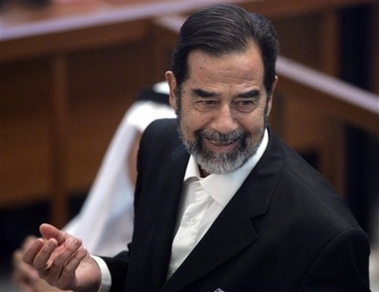BAGHDAD, Iraq - A 56-year-old Kurdish-American woman told of seeing people
sickened and dying during an alleged chemical attack carried out by Saddam
Hussein's forces, as his genocide trial resumed Monday after nearly a three-week
break.
Katreen Elias Mikhail, a Kurdish Christian and former militia fighter, said
four Iraqi planes unleashed a wave of bombs on the evening of June 5, 1987, on
the Kurdish town of Qalizewa in northern Iraq, sending people fleeing for
shelter.

Former Iraqi president Saddam Hussein
testifies as his trial resumes in the fortified Green Zone in Baghdad,
Iraq Monday, Sept. 11, 2006. [AP] |
"I smelled something dirty and strange," she told the court.
Mikhail said she was stranded in an underground shelter with her friend Umm
Ali and dozens of other people.
"Then, I heard comrade Abu Elias shout 'is there a doctor here?'" said the
dignified-looking woman, her left hand trembling.
"People were falling to the ground. They vomited and their eyes were blinded.
We couldn't see anything."
"We were all afraid," she said, her voice cracking. "It was our first time
seeing bombs falling on our heads."
Sitting in the witness stand, she said her friend Nashme told her that "the
whole town was hit with chemical weapons."
When the smoke subsided, Mikhail said she saw some people with "burn wounds
and they were blind; I was able to see just a little."
Mikhail appeared to lodge a complaint against Saddam and his cousin Ali
"Chemical Ali" al-Majid, who are among the seven defendants charged in Operation
Anfal, a campaign to drive Kurds from sensitive areas near the Iranian border in
the 1980s.
The prosecution alleges that about 180,000 people were killed during the
campaign.
During the proceedings, a defiant Saddam Hussein clutched the Quran, Islam's
holy book, and insisted that the judge address him as the "president of Iraq."
Saddam's chief lawyer, Iraqi Khalil al-Dulaimi, was not present, but
attorneys for other defendants were on hand.
Monday's hearing began with an argument between chief judge Abdullah al-Amiri
and Saddam's Tunisian lawyer, Ahmed Saddiq. The judge asked Saddiq not to speak
on behalf of his client, but to consult the Iraqi attorney who heads Saddam's
defense. The lawyer rejected that and left the courtroom in protest.
The proceedings adjourned until Tuesday.
Saddam is still waiting a verdict on Oct. 16 in the first case against
him - the nine-month-long trial over the killings of 148 Shiites in Dujail
after a 1982 assassination attempt against him there. In that case as well, he
and seven other co-defendants could face the death penalty.
The Anfal trial, which began in August, is likely to take months. The
campaign was on a far greater scale than the Dujail crackdown.
Late Sunday, about 300 Kurdish demonstrators in northern Iraq demanded a
swift trial for Saddam, and also called for trials for Kurdish military
commanders who they said had worked with Saddam during the Anfal campaign. The
protesters, in the Kifri region of Iraq, about 105 miles southwest of
Sulaimaniyah, carried banners and headed toward the town's city council.
The Bush administration had argued that a US-led invasion of Iraq was needed
to unseat Saddam because he possessed weapons of mass destruction and had ties
to al-Qaida.
As recently as an Aug. 21 news conference, President Bush said people should
"imagine a world in which you had Saddam Hussein" with the capacity to make
weapons of mass destruction and "who had relations with al-Zarqawi," referring
to Abu Musab al-Zarqawi, leader of al-Qaida in Iraq who was killed in a US
airstrike in June.
A recent US Senate committee report found no link between Saddam and the
terror network, and Saddam's alleged possession of weapons of mass destruction
was debunked after the 2003 US-led invasion of Iraq, when none could be found.
Yet the Anfal case points to Saddam's alleged use of poison gas against Iraqi
citizens, a charge often leveled by the US administration.
Since the trial opened on Aug. 21, witnesses have offered grim testimony of
entire families dying in chemical weapons attacks against their villages. They
said survivors plunged their faces into milk to end the pain from the blinding
gas or fled into the hills on mules as military helicopters fired on them.
The 1987-88 crackdown was aimed at crushing independence-minded Kurdish
militias and clearing all Kurds from the northern region along the border with
Iran. Saddam accused the Kurds of helping Iran in its war with Iraq.
Kurdish survivors say many villages were razed and countless young men
disappeared.
They also accuse the army of using prohibited mustard gas and nerve agents.
But the trial does not deal with the most notorious gassing - the March
1988 attack on Halabja that killed an estimated 5,000 Kurds. That incident will
be part of a separate investigation by the Iraqi High
Tribunal.